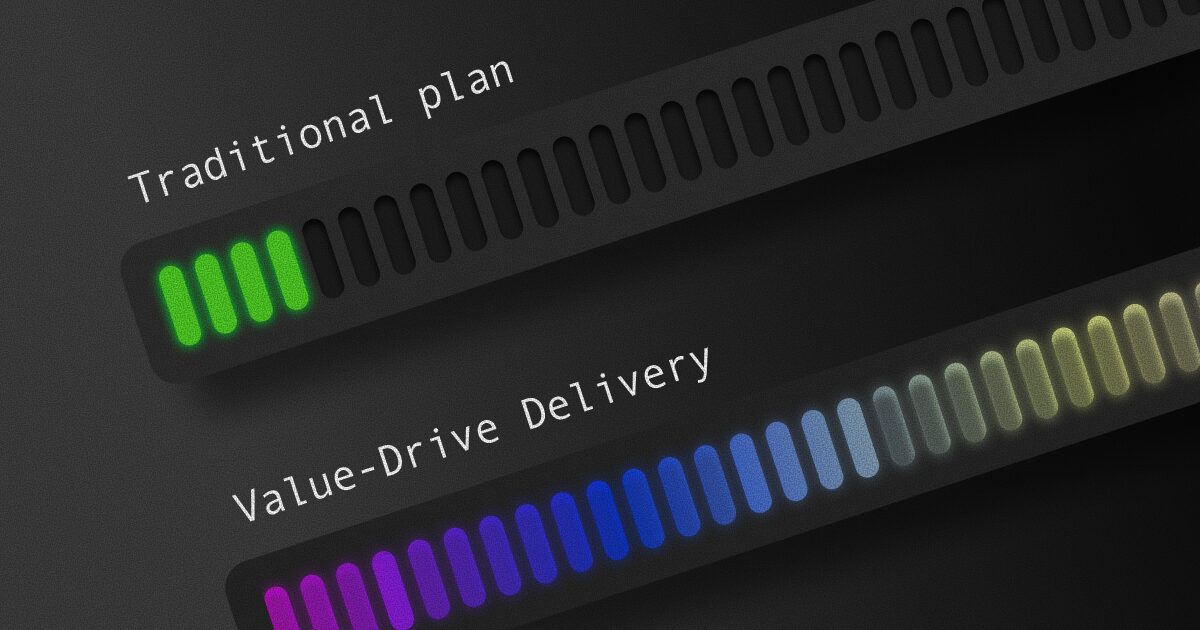March 22, 2024 - 5 min
AI Project Management: Dystopian Myth or Utopian Reality?

Unlock the potential of the future: Exploring how AI reshapes project management, turning challenges into opportunities and redefining the benchmarks of success. In a world where efficiency and innovation drive progress, AI emerges as the pivotal force in crafting solutions that transcend traditional boundaries.
Imagine constructing the pyramids without a plan. It would be an absolute logistical nightmare. While the formalization of project management as a profession might seem like a recent invention, its roots stretch back centuries, guiding the construction of some of humanity’s most awe-inspiring feats.
However, it wasn’t until the mid-20th century that project management bloomed, transforming from a pile of “soft skills” into a systematic discipline.
Our fellow project managers and IT professionals, in this exploration, I hope to demystify the role of AI in our field, showing how it can enhance our work rather than replace it. So if you are navigating the complexities of software development or guiding multi-disciplinary projects, this blog will light the way for AI’s potential to revolutionize project management as a more efficient and innovative practice.
Today, as we hurtle towards the “post-AI” era, we find ourselves at another pivotal point. Artificial intelligence is poised to revolutionize project management, particularly within the ever-evolving realm of IT.
Recent research by McKinsey paints a clear picture: AI is no longer a “maybe” – it’s an essential driver for project success, shaping how we strategize and achieve outcomes. So, get ready to dive into the fascinating future of project management, where human ingenuity meets the power of artificial intelligence!
From Manual to Modern: The Evolving Landscape
Originally, functionally, project management was manual, driven by paperwork, physical meetings, and basic software. Proficiency demanded deep project knowledge and oversight of timelines, resources, and scope. Human judgment, leadership, and creative solutioning were front and center.
Today, the profession has been completely revolutionized, with advanced digital tools, sophisticated collaborative project management software, and real-time communication. Modern project managers use data, cloud collaboration, and agile methods to optimize the speed of decision-making and change, often at the expense of intuition. The result is more data-driven, analytical, and collaborative enterprise outcomes.
Gartner’s research forecasts a “significant change” by 2026, with over 80 percent of organizations taking the plunge on new data management to not just take advantage of a broad set of data sources, but process them for “actionable insights”.
The company’s analysts also anticipate a corresponding explosion in AI. Generative AI used for newer processes will be used by fewer than 5 percent of enterprises now, but that should rise to more than 80 percent within the same three-year stretch (data from 2023).

AI: A Powerful Present-Day Partner
Imagine if you could get up to 5 extra hours of your week back — that’s the kind of time-saving magic AI tools can work for project managers. And in a recent McKinsey study, it turns out AI can automate up to 40% of the repetitive tasks project managers do every day. This allows project managers to focus on what they’re best at – getting things done.
It’s like having a very competent, even brilliant, assistant. One that is analyzing vast amounts of data to understand the ins-and-outs of your project. One that can maneuver through all the complexity of modern IT (microservices, cloud, cybersecurity, etc.) and suggest what those initial strategies could be, based on this specific set of circumstances and, based on past experiences by you, with your data in your industry. So, instead of drowning in scheduling, reporting, and data-to-decisions, you can step back and have more time to think about and engage with the broader picture.
But it’s not a “job-stealer” (yet). The thing is, today’s AI is really good at automation. And that’s mostly about it. That means all those other parts of project manager wisdom: your track record on estimates, and your creative ability to spot potential snags from the vague glimmerings of uncertainty in some status report. Or that feel for how the unique intersection of your particular project, and its people, technologies, and political context – are just the stuff that machines are simply not good at (yet).
But, they’re great teammates, though, and they’ll increase your productivity by carrying the workload and significantly improving decision-making accuracy. So, we don’t need to make AI an “enemy” to be afraid of, as new as this field is. We can look to our bionic project management future just like a superhero’s because the future is bright.

AI’s Unforeseeable Future: Adapting to and Benefiting From Change
Predicting the future of any technology, let alone one that’s as complex and mysterious as AI is fraught with challenges, but we can focus on a near-term event: the arrival of Artificial General Intelligence (AGI). Though the arrival date remains in question, its adoption and impact will be so widespread that it will fundamentally reshape how we work, especially in IT.
While that broader future looms, the impact is more clear and immediate: AI-powered tools and the capabilities they provide are significantly affecting project management and are reshaping how that role will be executed. AI’s tremendous progress is something IT project managers have always understood for their organizations.
Yet in all of these tasks, a project manager is rarely the literal overseer. More often than not, they’re responsible for coordinating engineers and steering them in the right direction, implementing changes from the top. This isn’t going to work in the AI era – project management will adapt alongside the industry. It’ll shift from managing projects to leading the individual and their activities according to project strategies.
It’ll become a more visible guiding hand for a workforce that’s increasingly AI-oriented. This isn’t to say that humans will disappear, but they could end up specializing in a very different set of tasks.
Regardless of the tasks at hand, the difference between high performers and everyone else is clear: the former will skew heavily toward AI. It hints that project management could rely much more on AI to drive strategic initiatives and innovation.
Instead, companies are likely to see a future where project management is a far more involved, far more data-driven affair. The fruits of that labor could be very promising. Integrating AI into project management should produce “unprecedented” productivity improvements and strategic insights, according to PMI and Forbes. For instance, a 2023 report by McKinsey Global Institute estimates that AI can increase global productivity by up to 1.5% annually. Additionally, a PWC report cited in Business Insider highlights studies suggesting AI can automate up to 40% of project management tasks, potentially leading to cost savings. These trends suggest that AI integration in project management holds promise for boosting efficiency and potentially reducing project costs.
The bottom line? After a few years, the AI era could not only make project management more valuable, but more captivating.
Unwritten Future: Project Management Beyond Limits
One thing is certain; the future isn’t set. The immediate future may offer the promise of a world where AI and humans collaborate in unprecedented and unimaginable ways, but what about the long term? What happens to that human-AI relationship as we move beyond today’s AGI and toward the likes of Artificial Super Intelligence (ASI)?
At that point, the very concept of project management as we know it might be redundant. Project visualization and record keeping could be entirely the domain of AI entities so advanced that we have an entirely different landscape that no longer features humans as project managers.
If and when that future emerges — and it is a distant if — it underscores how work continues to evolve and the need to continue to do the same. The power of human innovation, after all, is also what continues to carry us forward. The transformative power of AI is incredible, but it’s important that we also continue to foster those traits that still make it valuable for us to be here alongside all of AI’s capabilities and power.
Give Kudos by sharing the post!






